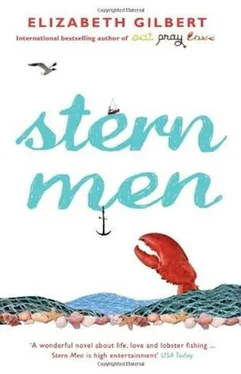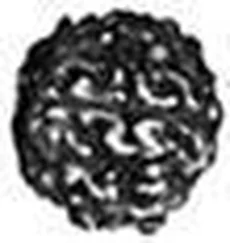The boat ride back to Fort Niles took more than four hours, during which Ruth and her father did not converse much, because the boat was loud and because she had to slip around in the stern to make sure that the boxes of groceries didn’t tip over or get wet. She thought about her plans for the summer. She had no plans for the summer. While loading the boat, her father had informed her that he’d hired a sternman for the season-Robin Pommeroy, of all people. Ruth’s father had no work for his daughter. Although she griped at him for leaving her out, she was secretly pleased not to be working for him again. She would have acted as his sternman strictly on principle, had he asked, but she would have been miserable out there. So it was a relief. Still, it meant she had nothing to do with her time. She was not sufficiently confident of her abilities as a sternman to approach any other fisherman and ask for a job, even if she had really, really wanted one, which she really, really did not. Besides, as her father had also informed her, everyone on Fort Niles already had help. All the partnerships had been negotiated. Weeks before Ruth showed up, every old man on Fort Niles had found a young man to do the muscle work in the back of the boat.
“Maybe you can pick up if other kids get sick or fired,” her father shouted to her suddenly, midway through the journey back to Fort Niles.
“Yeah, maybe I’ll do that,” Ruth shouted back.
She was already thinking ahead to the next three months and-who was she kidding?-to the rest of her life, which had absolutely no shape to it. Good God! she thought. She was facing backward, sitting on a box of canned goods. Rockland was long since out of sight on this misty day, and the other islands, inhabited or not, that they passed so slowly and so loudly looked as small and brown and wet as lumps of shit. Or so Ruth thought. She wondered whether she could get another job on Fort Niles, although the idea of a job on Fort Niles that didn’t involve lobstering was something of a joke. Ha-ha.
What the hell am I going to do with my time? Ruth thought. She felt an awful and familiar sense of boredom rise within her as the boat chugged and bumped over the cold Atlantic bay. As far as she could see, there was nothing for her to do, and she knew exactly what that meant. Nothing to do meant hanging around with the few other islanders who had nothing to do. Ruth could see it coming. She was going to spend her summer hanging around with Mrs. Pommeroy and Senator Simon Addams. She could see it coming clearly. It wasn’t so bad, she told herself. Mrs. Pommeroy and Senator Simon were her friends; she was fond of them. They’d have lots to talk about. They’d ask her all about her graduation ceremony. It wouldn’t be so boring, really.
But the uneasy, unpleasant sense of approaching boredom remained in Ruth’s belly, like seasickness. Finally she drove the boredom- already! -down by composing in her mind a letter to her mother. She would write it that night, in her bedroom. The letter would begin, “Dear Mom: As soon as I stepped back onto Fort Niles, all the tension drained out of my body and I took the first deep breaths I have taken in months and months. The air smelled like hope!”
That’s exactly what she would say. Ruth decided this on her father’s lobster boat precisely two hours before Fort Niles was even in sight, and she spent the rest of the trip mentally composing the letter, which was most poetic. The exercise cheered her up a good deal.
Senator Simon Addams was seventy-three years old that summer, and he had a special project going. It was an ambitious and eccentric project. He was going to search for an elephant’s tusk that, he believed, was buried in the mudflats at Potter Beach. The Senator thought there might even be two tusks buried out there, though he’d announced that he would be happy to find just one.
Senator Simon’s conviction that 138 years of seawater would not have impaired such strong material as pure ivory provided him with the necessary confidence for his search. He knew the tusks must be somewhere. They may have been separated from their skeleton and from each other, but they would not have decomposed. They could not have dissolved. They were either buried in the sand far out at sea or they had washed up on a beach. And the Senator believed they may well have found their way to Fort Niles Island. Those rare elephant tusks may have been swept by currents-as wreckage had been swept for centuries-right up on Potter Beach. Why not?
The tusks the Senator sought were from an elephant that had been a passenger aboard the 400-ton steamboat Clarice Monroe, a vessel that went down right outside Worthy Channel in late October of 1838. It was a famous event at the time. The steamer, a wooden side-wheeler, caught fire just after midnight, during a sudden snowstorm. The fire itself may have been caused by so simple a mishap as a tipped lamp, but the storm winds caught and spread it before it could be contained, and the deck of the steamer was quickly blanketed in flame.
The captain of the Clarice Monroe was a drinker. The fire was almost certainly not his fault, but it was his undoing. He panicked shamefully. Without waking the passengers or crew, he ordered the one sailor on watch to lower a single lifeboat, in which he, his wife, and the young sailor rowed away. The captain left the doomed Clarice Monroe, his passengers, and his cargo to burn. The three survivors in the rowboat became lost in the storm, rowed for a full day, lost the power to row any further, and drifted for one day more. When they were picked up by a merchant marine vessel, the captain was dead of exposure, his wife had lost her fingers, feet, and ears to frostbite, and the young sailor had completely lost his mind.
Without her captain, the Clarice Monroe, still burning, had drifted against the rocks off Fort Niles Island, where she broke up among the waves. There were no survivors among the ninety-seven passengers. Many of the corpses drifted over to Potter Beach, piling up in the brine and mud alongside the charred and battered wooden wreckage of the steamboat. The men of Fort Niles gathered the corpses, wrapped them in burlap, and stored them in the icehouse. Some were identified by family members who came to Fort Niles throughout the month of October on ferry boats to collect their brothers and wives and mothers and children. Those unfortunates who were not claimed were buried in the Fort Niles cemetery, under small granite markers inscribed, simply, DROWNED.
But the steamboat had lost other cargo.
The Clarice Monroe had been transporting, from New Brunswick down to Boston, a small circus made up of several remarkable items: six white show horses, several trick monkeys, a camel, a trained bear, a pack of performing dogs, a cage of tropical birds, and an African elephant. After the ship broke up, the circus horses tried to swim through the snowstorm. Three drowned, and the other three reached the shores of Fort Niles Island. When the weather cleared the next morning, everyone on the island turned out to see the three magnificent white mares gingerly picking their way across the snowy boulders.
None of the other animals made it. The young sailor from the Clarice Monroe, found in the rowboat with his dead captain and the captain’s devastated wife, driven to delirium by exposure to the storm, said upon his rescue-insisted!-that he had seen the elephant jump over the railing of the burning wreck and swim strongly through the waves, its tusks and trunk lifted high above the churning, icy water. He swore he had seen the elephant swimming through the salty snow as he himself rowed away from the wreck. He saw the elephant swim and swim and then, sounding one last mighty trumpet, sink beneath the waves.
Читать дальше









